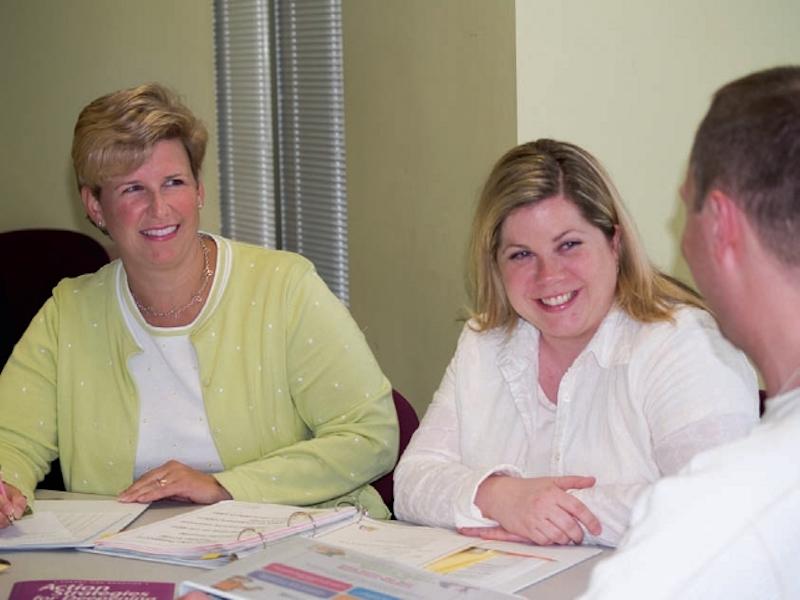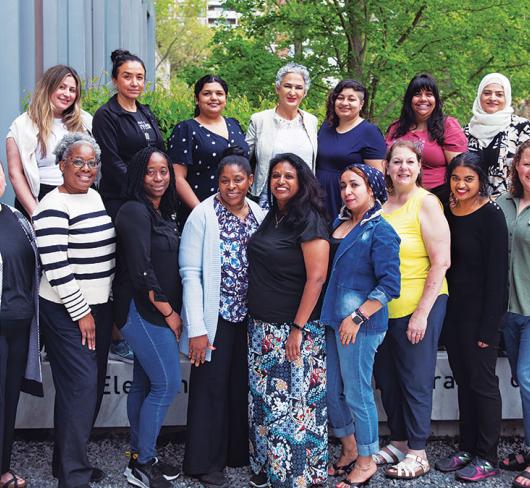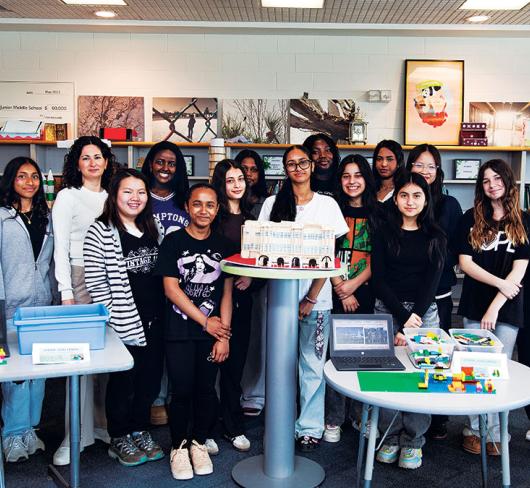
Imagining Leadership: Learning While Leading
Graduates of education faculties embark on an exciting learning journey. Teachers have the opportunity throughout their careers to teach in a variety of roles in their school. A leadership role appeals to some. At one time, this meant becoming a principal. Today, however, there are numerous routes that teachers can follow as they consider roles of added responsibility.
Leadership and professional learning go hand in hand. In this article, ETFO members who are teacher leaders describe the essential role that continued professional learning plays in their work. Each began by taking on small leadership roles in their school or board. They found that each leadership activity was also a professional learning opportunity.
Like others looking for an opportunity to share more formally with colleagues, Jennifer Paziuk, a teacher librarian in the Halton District School Board, found teaching Additional Qualification courses to be a natural next step.
She had been a workshop leader in her board and throughout the province for a few years. As an AQ instructor Paziuk has found that being aware of current research and new instructional approaches is essential, and now professional reading plays a key role in her learning and preparation. Because she may teach Parts 1, 2, and 3 together she must differentiate the various topics, and dig deeply into the research and pedagogy to have enough interesting and relevant materials for each course.
Sue Pasian, a Literacy Improvement Project Teacher in the Hamilton-Wentworth School District, has also found that keeping current is critical to her work. During the last few years, some boards have introduced new coaching roles so that a school-based teacher leader can work with other teachers in the school. Pasian was excited about this role. “It is such a wonderful opportunity to work with educators in many different settings and see what works or doesn’t work in their particular situation,” she said. She has found that visiting other teachers’ classrooms has helped her gain significant insight into her own practice and enhanced her professional growth. She has also participated in numerous professional activities to acquire new knowledge in the area of literacy. Now when she participates in professional learning, she thinks about the content as well as about how she will integrate what she has learned into her own presentations with teachers, a significant new approach for her.
Curriculum consultants or coordinators are teacher leaders who focus on curriculum implementation and facilitating professional development, a role that requires continual learning. Kristi Manuel (Peel District School Board), Sheridawn Maloney (Rainbow District School Board), and Michelle Skene (Ottawa-Carleton District School Board) have found that working as consultants has led to numerous professional development opportunities. Maloney believes that to be prepared, she has to be familiar with current research and professional resources so that she can share them with teachers. Skene has attended presentations by influential education leaders and has integrated knowledge of new research and strategies into her work. Manuel experienced significant learning in provincial level sessions with other math leaders that “stretched and deepened” her own under- standing of mathematics and helped her become a more effective facilitator.
Maloney did not anticipate the professional learning that resulted from teamwork with two consultant colleagues. In the classroom she had mostly worked alone. The three consultants plan and deliver professional learning sessions as a team and provide each other with feedback. They enjoy the challenge of analyzing and synthesizing new ideas and illustrating them in practical contexts so that they are able to inspire and empower teachers. They have also found that working at the board level has necessitated learning about a wider range of topics – other grades, divisions, and subject areas – so that they are able to work with teachers from kindergarten to secondary school.
These teacher leaders now look at new professional development from two perspectives: the content and how to bring that back to their work with teachers, and the strategies used to engage adult learners. When, on occasion, workshop participants are negative or uninterested, consultants have to use a variety of interpersonal and conflict-resolution skills. By observing other presenters, these consultants learn new ways to work with their colleagues as they promote and deliver professional development.
Expanding her horizons and skills has been “the most enjoyable, and rewarding” experience of Krista Walford’s career. She is currently seconded to the faculty of education at OISE/UT from the York Region District School Board. At OISE she has developed a better understanding of how the education system works as an integrated whole, and as a result of attending international conferences has gained a more global perspective of education. Being part of a committee developing an international mentoring conference has provided her with an opportunity to enhance her organizational skills and learn from experts in the field. Working at the faculty has also made her more aware of online learning – something she has come to love!
Expanding her educational horizons has also been a benefit for Dianne Riehl after being seconded to the Ministry of Education. Prior to her secondment from the Toronto District School Board, Riehl was an instructional leader and her focus was Toronto. Her work at the ministry overseeing the revision of the kindergarten program gave her provincial and global perspectives. Assimilating current research and creating a program document stretched her professional learning, and focusing on one area of education allowed her to go to a deeper and more complex level. Riehl believes she was well prepared for her role thanks to participation with colleagues in action research and book clubs.
Ongoing professional development enhances the knowledge and skills of all teachers and most certainly of those who take on leadership positions. Their professional development occurs every day in the course of all their work. It takes a variety of forms and helps them stay attuned to cutting-edge strategies. They examine the professional development activities they attend through lenses that help them learn new content as well as enhance the ways they work with adult learners.
These teacher leaders have discovered leadership opportunities in their schools, at district boards, and at the provincial level. As research plays an increasingly greater role in instructional decisions, there will be an increased need for teachers to take on these roles. Leadership and professional learning go hand in hand: the opportunity exists in every role.

